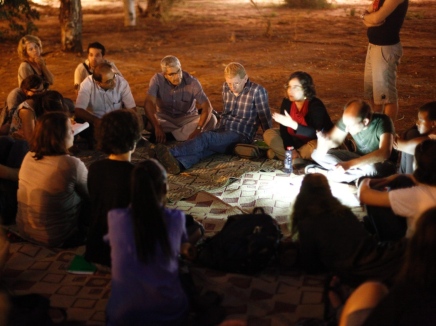At the end of April, 2012, Zochrot agreed to a request by students from the college to help organize an event in commemoration of the Nakba in connection with International Nakba Day, May 15. A group of students, together with faculty supporting them, began organizing a tour of Shaykh Muwannis and an evening symposium on the Nakba with the participation of Sami Abu Shehadah, Amaya Galili and Eyal Naveh. The students hoped to create a space on campus for an open, frank discussion of the issue. But the college administration imposed many obstacles and restrictions on the project from its inception.
Using a variety of bureaucratic excuses, the college administration made planning the event difficult (and eventually impossible), by setting conditions and making substantive demands which are normally not imposed on events organized independently by students at the college.
The students, who had originally planned to hold the event under the auspices of the student government association, were turned down, and told to obtain approval for an independent student activity from the Dean of Students. Dr. Dvorah Gesser, The Dean, sent them to the head of the School of Education, Dr. Yehudit Weinberger, who responded that “there’s no reason to discuss the Nakba on a particular day,” and that in any case the Kibbutz College addresses the Nakba throughout the year. The students insisted, saying that the educational activity would provide an opportunity for discussion and analysis, and is therefore appropriate for the college, particularly in view of its stated aspiration of providing a forum for innovative and critical educational initiatives. In view of the students’ insistence, the administration began crudely to impose conditions on the content of the program. These included a demand to change the title of the event, rewording the phrasing of the invitation, choosing the chairperson for the discussion and vetting of panel participants to insure balance “because the topic is controversial”. It was made clear to the students that approval of the event depended on their agreeing to those conditions.
The students decided to agree to these conditions despite their displeasure at the administration’s censorship and crude interference in the content of the event, limitations that were not normally imposed on independent student activities, in order to be able to carry out what they felt was an important activity. They changed the title of the discussion from “What does the Nakba mean to me?,” to one determined by the administration, “Narratives of independence and rebirth or Nakba – catastrophe and disaster – can they co-exist?” And they also invited an additional speaker, Gil’ad Maniv, a teacher and pedagogical advisor in the Ministry of Education – in line with a written set of demands they’d received from the head of the School of Education. Nevertheless, the college administration refused to approve the event and continued to demand additional changes in wording. For example, instead of “Female students invite you,” to “Students invite you;” adding the Hebrew date; and other edits. The students agreed to these conditions, not without considerable dissatisfaction, and understood the event is approved. As this was already 2 days before the event to be held, they started to work openly to publicize the event and invite students.
As late as an hour and a half prior to the start of the event, the college administration continued its bureaucratic approach, its opacity, nebulous responses and its censorship of content and phrasing, until it finally denied permission to conduct the event, claiming it had never agreed.
That evening we wandered through the college confronting classrooms that had been locked to us, going from one lawn to another, while in the background stood Dr. Yehudit Weinberger and representatives of the student government association, threatening to prevent the event from being held on campus and to bring the students before the disciplinary committee for planning an event that had not been approved. We finally convened on mats in a grove of trees outside the college fence, a grove that had been planted on the site where the home of the Baydas family once stood, former inhabitants of the village of Shaykh Muwannis. The house had been demolished in 2003 in order to construct apartment houses and expand the college. The event was successful; about 70 students participated. At the close of the panel students expressed interest in continuing to learn about the Nakba, both at the college and outside it, despite the administration’s attempts to prevent discussion of the topic.
The behavior of the college administration, from the inception of the initiative until the administration’s final refusal, resulting in the event being held beyond the fence, is continuing evidence of the importance of considering the Nakba in institutional educational settings. Not only that – it raises the question of how an institution which claims to be humanistic in outlook, one that educates for social responsibility, can be so determined to repress and censor free speech and the activities of its students. How can it imagine that ignoring and silencing discussion of such a complex, emotional and central a social issue like the Nakba can be a lasting educational and pedagogical strategy?
We call on the college administration to behave in a manner consistent with the values it claims to uphold, to continue a dialogue and discussion with the students, to support commemoration and study of the Nakba in a variety of ways and to refrain from disciplinary action against student activists.

אירוע על הנכבה בסמינר הקיבוצים / Nakba Event at the Kibbutzim College



